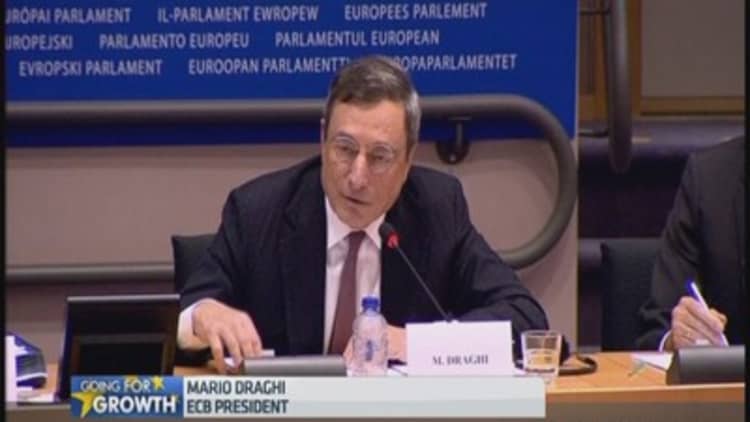
The euro zone's growth has weakened over the summer months, European Central Bank (ECB) President Mario Draghi told European lawmakers Monday, but stressed that he was willing to do more to stimulate the economy—including the purchase of government bonds.
Speaking at the European Union's Parliament, Draghi reiterated that the bank's governing council remained "unanimous in its commitment to using additional unconventional instruments if needed."
Read MoreECB 'very likely' to buy sovereign bonds: Ex-Member
He added: "The other unconventional measures might entail the purchase of a variety of assets, one of which is sovereign bonds." The comments helped the pan-European FTSEurofirst 300 close 0.5 percent higher on the day.
The central bank has already launched a slew of stimulus in an effort to boost the economy by easing credit conditions. These include cutting interest rates to record lows and announcing plans to purchase covered bonds and asset-backed securities (ABS) - and there are calls for the ECB to do more by launching a U.S. Federal Reserve-style sovereign bond-buying program.
Read MoreUK PM warns on second global crash
Further measures, "could include changes to the size and composition to the Eurosystem balance sheet, if warranted, to achieve price stability over the medium term," Draghi added.
'Tangible benefits'
Draghi said there were signs that initial efforts to ease credit conditions were working, however.
"We see early indications that our credit-easing package is delivering tangible benefits. Since the beginning of June forward money market rates have shown steep declines across the security spectrum," he said.
Read MoreWhy the global economy could be in trouble (again)
His comments come after official figures showed the euro zone's economy grew more than expected in the third quarter, giving investors cause to breathe a sigh of relief after a string of disappointing data points for the region. The 18-country bloc that uses the euro grew by just 0.2 percent on the previous quarter, data published Friday showed.
But concerns about the health of the region's economy remain. The region is battling high unemployment and growth-sapping low inflation is particularly worrying, with price growth of just 0.4 percent in October.
"We need to remain alert to possible downside risks to our outlook for inflation," Draghi added on Monday.
Read MoreEuro zone GDP beats, Greece emerges from recession
Structural reform needed
The central bank president went on to push governments to commit to "concrete short-term commitments for structural reforms" and that monetary policy alone is not enough to encourage growth.
Draghi said next year, governments and European institutions had to work together to strengthen the region's economy.
"This is why there is an urgent need to agree on concrete short-term commitments for structural reforms in the member states... and to launch work on a long-term vision to further share sovereignty ensuring the sustainable and smooth functioning of the European Union," he said.
- By CNBC's Katrina Bishop


